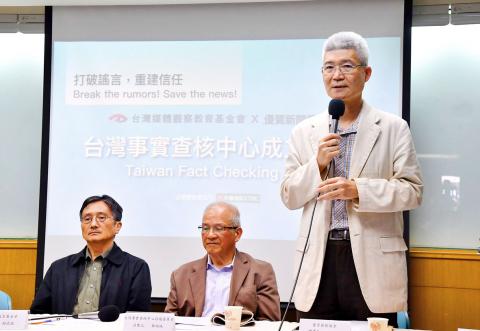The nation’s first fact-checking center was established yesterday to tackle the spread of fake news on social media.
The Taiwan Fact Checking Center (台灣事實查核中心), a partnership between the Taiwan Media Watch and the Quality News Development Association, is scheduled to begin operations in July.
The center would fact-check alleged fake news reported by social media users to media platforms or reported directly to it, and would work to verify news of public interest, Quality News Development Association chairman Hu Yuan-hui (胡元輝) said.

Photo: CNA
“We will adopt a three-stage approach that has been used by many established fact-checking organizations to verify the authenticity of information,” he said.
Four full-time staffers would be hired initially, and each allegation of fake news would be handled by at least three fact-checkers, he said.
Fact-checkers would be required to have relevant education and experience to help them determine the accuracy of the information, and they would also conduct interviews with experts if needed, he said.
After a news item is vetted by one fact-checker, a second fact-checker would review the documents and the information used by the first one and then the third fact-checker would conduct a final review on the words and logic used in the item in question as well as the documents used for verification purposes, he said.
If there are still disputes about veracity, the center would seek assistance from its consultants, Hu said, adding that it could also host experts’ meetings.
Before accepting a case, the center will determine if it has the resources and information to assess the topic, he said.
The center plans to invite Facebook, Google and LINE to assist it in tackling fake news on their platforms, he said.
Facebook cooperates more with non-governmental organizations than Google and LINE do, but at present it only works with the Taiwan Media Watch on media literacy, not fact-checking, Hu said.
Although Facebook has taken action to address fake news in other nations, it has been reluctant to do so in Chinese-speaking countries, Hu said.
Such measures include labeling certain new items as fake news and using algorithms to slow down the transmission of the information labeled as fake news, he said.
“The center does not receive any funding from Facebook” as the firm does not sponsor or provide funding to any fact-checking agency in the world, he said.
“We are not asking Facebook to sponsor the center’s operations. We are only asking it to handle news items on its platform if they are being vetted,” he said.
“We hope that Facebook can work with information specialists in Taiwan so that the technology can be used to tackle fake news as well,” Hu said.
CTBC Bank has provided initial funding, but the center needs to raise NT$2 million (US$68,166) itself.
Facebook remains reluctant to identify itself as a media outlet, saying that it is just a platform, but it has recognized that it must take responsibility for the information circulated on its platform, including fake news, Taiwan Media Watch public affairs director Lin Fu-yueh (林福岳) said.
“Media literacy remains the fundamental solution to the problems caused by fake news,” Lin said.
While Facebook has planned to utilize artificial intelligence to tackle fake news, the technology is not yet mature enough to detect all errors, Lin said.

Taiwan is to commence mass production of the Tien Kung (天弓, “Sky Bow”) III, IV and V missiles by the second quarter of this year if the legislature approves the government’s NT$1.25 trillion (US$39.78 billion) special defense budget, an official said yesterday. Commenting on condition of anonymity, a defense official with knowledge of the matter said that the advanced systems are expected to provide crucial capabilities against ballistic and cruise missiles for the proposed “T-Dome,” an advanced, multi-layered air defense network. The Tien Kung III is an air defense missile with a maximum interception altitude of 35km. The Tien Kung IV and V

The disruption of 941 flights in and out of Taiwan due to China’s large-scale military exercises was no accident, but rather the result of a “quasi-blockade” used to simulate creating the air and sea routes needed for an amphibious landing, a military expert said. The disruptions occurred on Tuesday and lasted about 10 hours as China conducted live-fire drills in the Taiwan Strait. The Civil Aviation Administration (CAA) said the exercises affected 857 international flights and 84 domestic flights, affecting more than 100,000 travelers. Su Tzu-yun (蘇紫雲), a research fellow at the government-sponsored Institute for National Defense and Security Research, said the air

A strong continental cold air mass is to bring pollutants to Taiwan from tomorrow, the Ministry of Environment said today, as it issued an “orange” air quality alert for most of the country. All of Taiwan except for Hualien and Taitung counties is to be under an “orange” air quality alert tomorrow, indicating air quality that is unhealthy for sensitive groups. In China, areas from Shandong to Shanghai have been enveloped in haze since Saturday, the ministry said in a news release. Yesterday, hourly concentrations of PM2.5 in these areas ranged from 65 to 160 micrograms per cubic meter (mg/m³), and pollutants were

Taiwan’s armed forces have established response protocols for a wide range of sudden contingencies, including the “Wan Chun Plan” to protect the head of state, the Ministry of Defense (MND) said today. After US President Donald Trump on Saturday launched a series of airstrikes in Venezuela and kidnapped Venezuelan President Nicolas Maduro, concerns have been raised as to whether China would launch a similar “decapitation strike” on Taiwan. The armed forces regularly coordinate with relevant agencies and practice drills to ensure preparedness for a wide range of scenarios, Vice Minister of National Defense Hsu Szu-chien (徐斯儉) told reporters before a